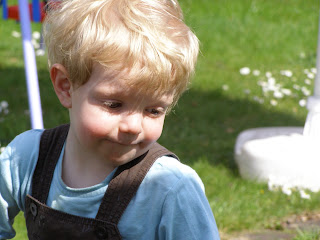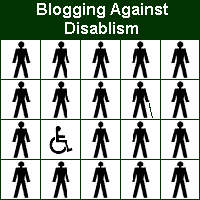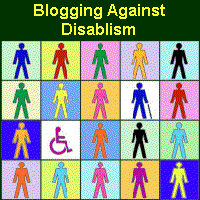I'm hoping to organise a third
Blogging Against Disablism Day this May 1st. Shortly before the first BADD, I wrote a
Brief Guide to the Language of Disability which was
very brief indeed. I thought it was about time I made a more comprehensive effort, although this is just
me explaining the different terms as
I understand them and may not be all that comprehensive. Where I express my opinion (which I'm going to), I don't pretend to speak for anyone else.
Whilst I frequently harp on about language and its importance, I am always alarmed when discussions come to a standstill over a simple word or phrase. This is why each Blogging Against Disablism Day I have asked for a
Language Amnesty; discussions of language are welcome, but we need to bear in mind that we're all coming from different places (quite literally).
Whether language is correct or incorrect depends entirely on what the speaker means to say. So the language of disability hinges on what people understand
disability to be. The main controversy being
Disabled Person vs. Person with DisabilitiesThe preferred term generally hinges to on (a) geography, (b) identity politics and (c) a person's particular medical condition or impairment. And, unsurprisingly, a person's identity politics is likely to be influenced by both geography and their particular medical condition or impairment.

In the United States and Canada,
person with disabilities or
person with a disability is generally preferred. There, disability has been traditionally understood as something that is wrong with an individual; a medical condition, an illness, an injury, a sensory or intellectual impairment. For this reason, there are groups of people who wish to divorce themselves from the label. Some Americans with autism or deafness, for example, argue that their condition is
not a disability, because they do not perceive it as any kind of problem.
Because disability is something that belongs entirely to the individual, it is correct to use this "people first" language. In this context, the difference between
person with disabilities and
disabled person is a bit like the difference between
vase with a break and
broken vase. It is also far more appropriate, for example, to describe someone as
a person with depression than
a depressive person. Since depression (or any other condition) might be the disability in this context,
person with a disability makes total sense.
In the United Kingdom,
disabled person is more often preferred. Whilst not everyone understands or agrees with the politics, the reason this term has been advocated is because of a way of understanding disability called
The Social Model of Disability. This asserts that there is a difference between those limitations we experience because of medical conditions, injuries and impairments and those limitations we experience because of the artificial social and physical barriers we experience in society. Only this latter group of limitations may be called
disability; it is, after all, the only thing that we all have in common and the only thing we have any hope of changing.
Many people agree that the limitations that disabled people face arise from these two different sources, but this use of language remains somewhat radical, even thirty years after its conception. What people tend to hear is "It's all society's fault and if there were only a few more ramps about, we wouldn't have any problems."
There will always be some people who have difficulty doing some things, and some of us will always have unpleasant physical, cogntive and emotional symptoms to contend with however society might improve. However, people who take this position simply don't call those problems
disability. And because disability is something people experience as opposed to something that belongs to them, "disabled person" is preferred. It is a political status, very much like queer or black. And as with those terms, a small minority of people prefer to use a capital D.
It should be noted that not all British disabled people know of, let alone understand or subscribe to the Social Model, and of course most disability activists and academics in the rest of the English speaking world are well acquainted with these ideas at this point. Many people use both terms at different times. But that's your basic difference between the two terms, as I understand it.
Other Terms for Disabled PeopleOften attempts are made to take the sting out of the concept of disability.
Dis- is, after all, a negative prefix and
disabled is often used in other contexts, such as computing and electronics, to indicate that something is completely non-functioning. What's more, because of our negative cultural attitudes towards disability and disabled people, some people just don't want to fall under that label. Some people argue that if society sees disabled people as useless and dependent, then the solution is to use another term. We should "see the ability, not the disability". Others even argue that "disability is a state of mind".
Personally, I don't see a problem with the negative term; whilst it is by no means the worst thing that can happen to a person, disability
is a disadvantage. However, several attempts have been made to find a neutral or even a more positive way of describing our situation. Most of these are euphemistic, with the rather odd exception of
handicapped.
Handicapped / People with Handicaps Handicapped
Handicapped has a very bad name in the UK, and seems to be losing popularity elsewhere. Part of this is due to the myth that handicapped comes from begging, "cap-in-hand", from a time where the only conspicuous disabled people had to beg for a living.
This isn't true. "Handicap" is a common word in horse-racing, golf and other sports and originates from a medieval gambling game "hand-in-cap" which involved drawing lots. There is a full explanation in
the 1911 Encycopedia Brittanica, composed before
handicap was first used in the context of disability.
Some people who take objection to words beginning with
D, see
handicapped as a positive label. In sports, a handicap is a disadvantage imposed on a superior competitor in order to make it a fairer game or race. So if we are handicapped, well maybe we're just brilliant and this is the universe's way of leveling things up for everyone else. A fanciful but undoubtedly positive notion.
Unfortunately, experience has put me off this term. Because it fell out of favour long ago, sensitive people don't tend to use it, regardless of whether they understand the objections against it or the etymological arguments. I'm afraid its usage has been accompanied by ignorance and prejudice often enough that I cringe every time I read or hear it. Which is a shame.
Modern Euphemisms for Disability
There are a number of euphemisms used when talking about disability, especially - though not exclusively - where disabled children are involved. This is understandable; if the world sees
disabled as broken, useless, then children with this label are in danger of growing up with some pretty negative ideas about themselves. Many parents and educators try to protect them from this with more innocuous language.
I have great sympathy with this, but I'm doubtful about its effectiveness. When someone is determined not to say what they really mean, they don't always notice what they're really saying. So to speak.
Differently-abledSome disabled people's abilities are in no way inferior to those of their non-disabled counterparts, but merely different. The wonderful
Institute for the Study of the Neurologically Typical demonstrates rather brilliantly.
Unfortunately, so long as
different is perceived as an issue, it is a disadvantage. Imagine if someone described people who weren't white as
differently-coloured or people who weren't men as
differently-gendered. This is by no means neutral language.
And that's only if we give the phrase the benefit of the doubt. If we take it literally, everybody is
differently-abled and the phrase means nothing at all.
Physically Challenged,
Intellectually Challenged etc.
The language of
challenges has often been used to replace language which was felt to condemn. For example, replacing
delinquency with
challenging behaviour, or
poverty with
economic challenges. Yes, I know it is a common tool of the fork-tongued, but it's not always complete nonsense.
However, our impairments are not challenges. A challenge is necessarily something which may be overcome, whereas the status of our bodies and brains is pretty much immovable. These terms also nod to the
triumph over adversity narrative which is as problematic a stereotype as anything that
disabled ever threw up.
Special,
Handicapable etc.
These terms go beyond an attempt at neutrality and try to make disability something positive. I've never actually heard a real person use the word
handicapable out loud, but
it is used.
Special, meanwhile, is widely used, particularly in education.
Special Educational Needs can encompass a massive range of impairments, from severe intellectual impairments to mobility impairments.
Seahorse wrote
an excellent piece about
special and the way that teachers and non-disabled children can react to this label. Also on the BBC Ouch Blog, Nicola has also written about the
way teachers reacted to her, destroying her confidence with the best of intentions.
The word itself doesn't cause this patronising, sometimes exoticising attitude towards disabled people, but it undoubtedly backs it up. I'm afraid I have little good to say about this word and similar variations on the sentiment, but then I guess that being regarded as
special and being regarded as
equal are mutually exclusive.
 Reclaimed Terms
Reclaimed TermsInformally, many disabled people refer to themselves and one another using terms which have historically been used to insult, oppress and patronise them. The main two examples are
gimp which gives me images of black patent leather and chains but is very popular in the US and
crip from cripple. Other examples include
freak,
mutant and more impairment-specific terms like
nutter and
spaz.
Many disabled people, having had a period of coming to terms with their disabled identity, have a phase of using these words a lot, reveling in both the act of subversion and the sense of group-identity they provide. However, others are genuinely upset by them, especially those with raw memories of these words being used in malice. I tend to the view that as with all humour (because this
is largely about humour and fairly dark humour at that), there's a time and a place.
Incidentally, I also wrote a guide to
what we call them others (those who are not disabled) some time ago on the Ouch Blog, although I fear the debate was concluded when
JackP suggested
disability-challenged.
 Come on, it has been a while since you've seen any gratuitous materteral blogging on here.
Come on, it has been a while since you've seen any gratuitous materteral blogging on here. Alex still doesn't say much but he has learnt to count! Up to three at least. Mum was playing a game where she was saying "One, two three, hooray!" and Alex imitated her by say "Do, do, do, yeah!" several times over and he never one uttered more or less than three dos . Does that count as counting? I reckon so.
Alex still doesn't say much but he has learnt to count! Up to three at least. Mum was playing a game where she was saying "One, two three, hooray!" and Alex imitated her by say "Do, do, do, yeah!" several times over and he never one uttered more or less than three dos . Does that count as counting? I reckon so. He also participated in the ancient East Anglian tradition of pushing small children about in a wheelbarrow. This originates from the time that women used to give birth out in the fields and wheel their children home sat amongst the turnips. This resulted in many turnips being mistakenly brought up as human children, with one turnip making it so far as becoming Archbishop of Canterbury in 1093. Sorry, but if I don't plump up this paragraph there will be a big gap at the end of my text.
He also participated in the ancient East Anglian tradition of pushing small children about in a wheelbarrow. This originates from the time that women used to give birth out in the fields and wheel their children home sat amongst the turnips. This resulted in many turnips being mistakenly brought up as human children, with one turnip making it so far as becoming Archbishop of Canterbury in 1093. Sorry, but if I don't plump up this paragraph there will be a big gap at the end of my text.








